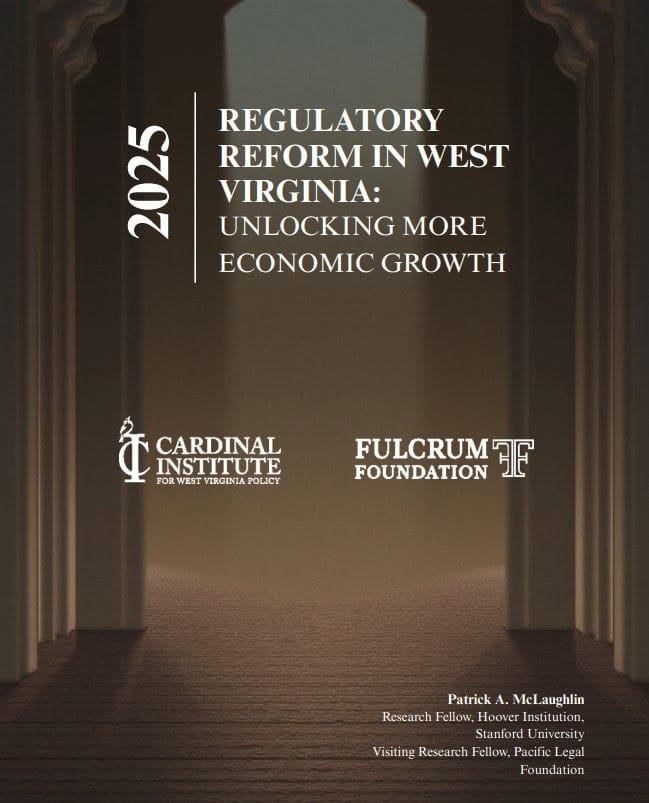
West Virginia Should Eliminate CON Laws
Cardinal Team
By Garrett Ballengee originally published by West Virginia Executive Magazine as an Executive Exclusive.
Experts say that certificate-of-need (CON) laws are hurting the quality of health care in West Virginia, but there are efforts to eliminate the onerous regulations. CON laws require health care providers to get permission before expanding or offering new services. While advocates argue this can prevent substandard care being performed by unqualified providers, detractors of CON laws say they help entrenched providers keep competition out of the market.
New York became the first state in 1964 to implement CON laws and was followed by some two dozen others over the next decade. Congress passed an act in 1974 that required states to implement CON requirements as a condition of receiving funding through certain federal health care programs. At the time, every state except Louisiana put CON requirements in place.
The prevailing theory was that CON laws would boost health care in rural communities, increase the quality of care and keep costs down. However, after that largely proved not to be the case, the federal government repealed the mandate in 1986. Fifteen states have since followed suit, but West Virginia and 34 other states as well as Washington, D.C., still have the laws on the books.
Mercatus Center at George Mason University in Arlington, VA, reports that West Virginia is the fifth most regulated state in terms of CON laws, with 24 regulated services. Hawaii leads the nation with 28.
State regulators in West Virginia have put into place CON laws for everything from MRI scanners to neonatal intensive care to rehabilitation services.
Matt Mitchell, Ph.D., senior research fellow at Mercatus, says the regulatory red tape created by CON laws can prove a nightmare, resulting in providers paying hundreds of thousands of dollars in fees and waiting years to offer services.
“It’s an opportunity cost,” he says. “You can’t see patients while you navigate the process.”
Mitchell also argues that it’s an unfair process, as legacy providers often serve as members of the boards in charge of considering the applications.
“Those incumbents who are allowed to sit on the boards or oppose the applications like these laws,” he points out.
Mitchell also notes that incumbents enjoy strong lobbying power, which makes it difficult for states to overturn CON laws. A recent study by Mercatus of CON laws across the country found that West Virginia residents would save $232 per capita if the regulations were eliminated. The think tank also found that West Virginia would see 5.5% fewer deaths that result from post-surgery complications if CON laws didn’t exist there.
These laws were blamed for the failed merger of The Health Plan and West Virginia University Health Systems last year, which would have combined services and helped fill in gaps in health coverage. The West Virginia Legislature took up the repeal of CON laws last year, but the movement didn’t get far.
House Majority Leader Amy Summers says she is focusing on education ahead of the 2021 session, establishing forums and creating opportunities for freshmen lawmakers in the House of Delegates to
learn more about the issue. According to Summers, CON laws are too complicated an issue to try to learn in a two-hour committee meeting.
“I have a lot of new members who need to understand this concept,” she says.
Perhaps because of their influence, the big health care companies have received the attention of legislators, but Summers, an emergency room nurse, says the philosophy needs to be flipped.
“I think lawmakers need to start looking at health care from the perspective of the patient and not the corporation,” she says.
While a recent study found that deregulation in some states that have at least temporarily eliminated some CON laws during the COVID-19 pandemic saved lives, West Virginia continues to remain rigid.
CON laws were put in place partially to prevent duplication of services, which in theory should keep the costs of health care down, but Summers says the lack of competition can be bad for consumers. If the existing providers don’t provide an adequate level of care, CON laws can prevent a better business from opening. The monopoly ensures a status quo that isn’t good for patients, according to Summers.
“If government prevents other entities from entering the market, we are party to it,” she says. “Is that the role we want to have in health care?”







